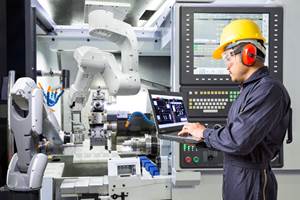How Proper Scheduling Leads to a Successful Machine Shop
Proper scheduling of jobs is paramount when it comes to running an efficient machine shop.
Share





If you have been working in a machine shop for many years, you will probably have been bombarded with information on how to make your shop more efficient. Machine tool dealers will tell how much more efficient you can be by utilizing their newer, faster and more capable machines. Tooling manufacturers will recommend their latest and greatest tools to make your machining processes faster and more efficient. Machine tool monitoring software companies will show you where you are losing time in the machining process.
These all play an important role in helping you be more competitive and should not be ignored, but in my opinion, they are not the most important thing to consider when it comes to running an efficient machine shop. I believe the fundamental key to an efficient machine shop is scheduling.
Whether you’re a large or a small machine shop, scheduling properly will make all the difference in making your shop more competitive. Here are some of the reasons why:
- Optimized Machine Utilization: By scheduling jobs effectively, a shop can ensure that machines are always in use, while also reducing idle time and increasing productivity. An idle machine in a busy shop can severely interrupt a shop’s ability to produce and meet deliveries efficiently.
- Smooth Workflow: Proper scheduling creates a better workflow, minimizing bottlenecks and ensuring that each stage of the manufacturing process runs smoothly. When this occurs, the quality of the parts being produced greatly increases. This leads to fewer production issues and less rework.
- Reduced Setup Times: Good scheduling allows for grouping of similar jobs together, which reduces the frequency of machine setup changes and saves time. Getting the next part or set of parts into production will lead to better throughput. Even though delivery to the customer is always the most important consideration, efficiency is what makes a machine shop competitive and allows it to remain in business.
- Minimized Downtime: Proper scheduling allows a machine shop to do proper preventative maintenance during off-peak hours. This will prevent unexpected breakdowns and allow for continuous operation of equipment when needed. Proper maintenance keeps equipment from breaking down when you need it most. I have seen many a shop unable to deliver because of an untimely breakdown. To make matters worse, this usually requires replacement parts to be expedited at an unreasonable cost, which adds to increased operational costs and idle time.
- Enhanced Labor Productivity: When jobs are properly scheduled, employees can focus on getting a setup done as quickly and efficiently as possible. When not scheduled properly, jobs are slow to get into production because employees are looking for tools, materials and more to get the setup done. This leads to jobs taking longer than necessary to get up and going. Employees can also get frustrated and become dissatisfied with their work environment when they are constantly facing roadblocks to getting a job going. Many employees have quit shops due to the frustration of poor scheduling.
- Lower Operational Costs: Effective and efficient use of machines and labor will result in lower operational costs. This will reduce things like energy consumption and lower wear and tear on equipment. Cost savings is the name of the game when it comes to being a competitive shop — these small details matter!
- Timely Deliveries: A well-scheduled shop will also meet customer demands on a consistent basis, enhancing customer satisfaction. Customers are often having to change deliveries and quantities based on ever-moving needs. A properly scheduled shop can deliver on this constant change. Competitors that do not schedule properly are often not given orders, because the customer does not want to risk missing critical deliveries.
It never ceases to amaze me how many shops prioritize buying new equipment, tooling or monitoring systems before reviewing their scheduling-related issues. In many cases, a shop can become much more competitive by focusing on scheduling, which does not cost a lot of money in comparison to purchasing and implementing new equipment. I do understand that proper scheduling takes time, but the result of these efforts is a smooth-running shop with satisfied customers, which is what keeps a machine shop in business!
Related Content
Tips for Designing CNC Programs That Help Operators
The way a G-code program is formatted directly affects the productivity of the CNC people who use them. Design CNC programs that make CNC setup people and operators’ jobs easier.
Read More6 Machine Shop Essentials to Stay Competitive
If you want to streamline production and be competitive in the industry, you will need far more than a standard three-axis CNC mill or two-axis CNC lathe and a few measuring tools.
Read More4 Commonly Misapplied CNC Features
Misapplication of these important CNC features will result in wasted time, wasted or duplicated effort and/or wasted material.
Read MoreHow to Meet Aerospace’s Material Challenges and More at IMTS
Succeeding in aerospace manufacturing requires high-performing processes paired with high-performance machine tools. IMTS can help you find both.
Read MoreRead Next
AMRs Are Moving Into Manufacturing: 4 Considerations for Implementation
AMRs can provide a flexible, easy-to-use automation platform so long as manufacturers choose a suitable task and prepare their facilities.
Read MoreMachine Shop MBA
Making Chips and Modern Machine Shop are teaming up for a new podcast series called Machine Shop MBA—designed to help manufacturers measure their success against the industry’s best. Through the lens of the Top Shops benchmarking program, the series explores the KPIs that set high-performing shops apart, from machine utilization and first-pass yield to employee engagement and revenue per employee.
Read More

















